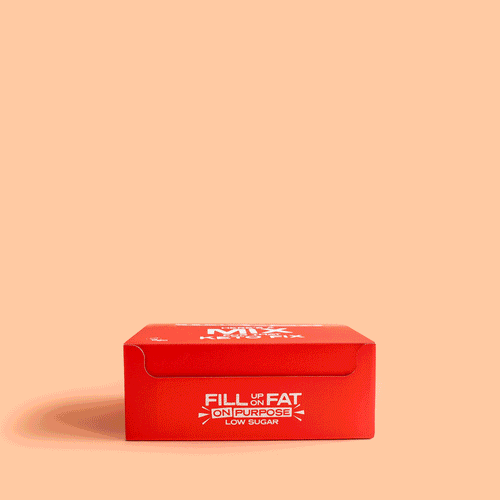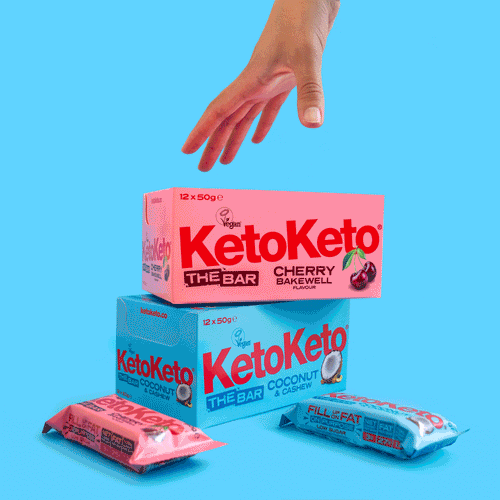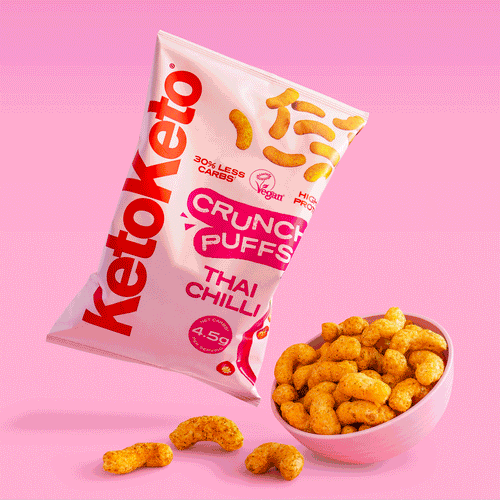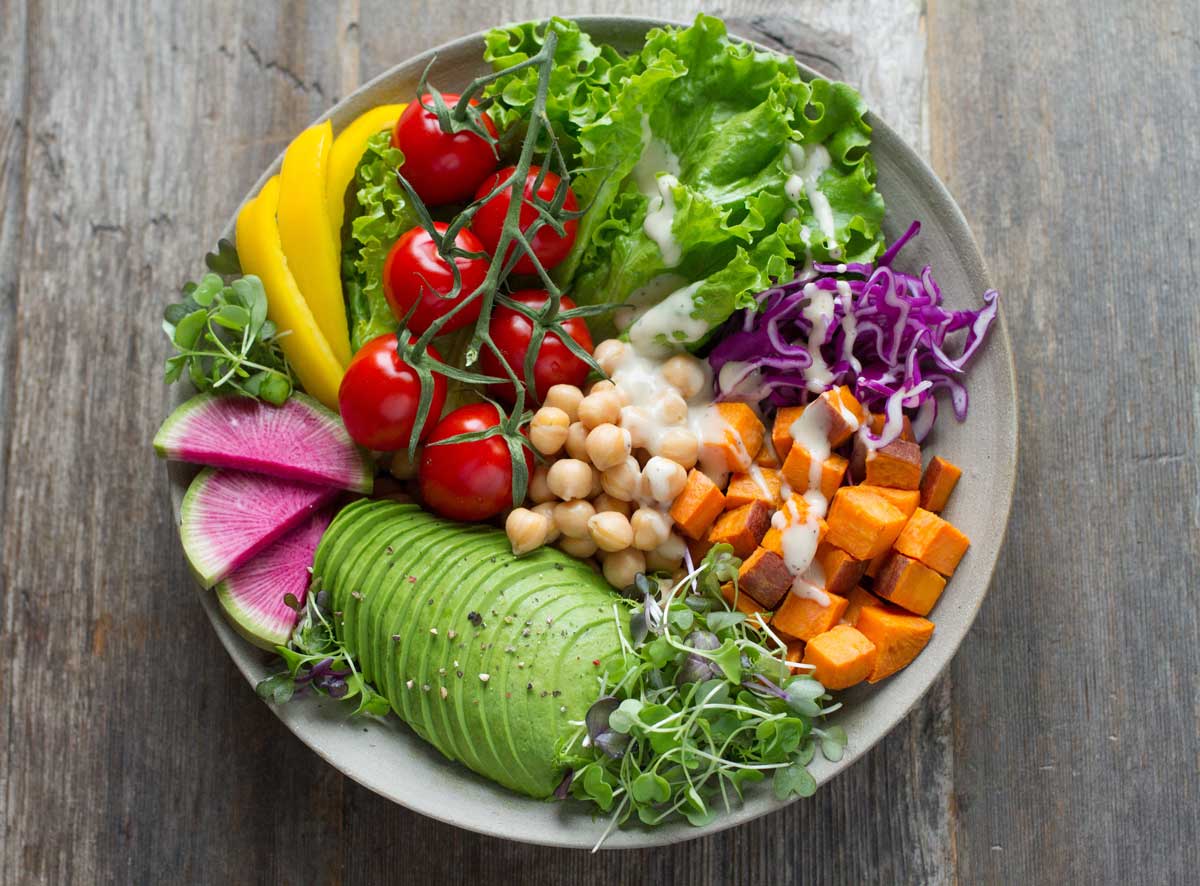There has been a huge rise in the popularity of veganism in recent years; health, animal suffering and climate change are all potential reasons for the growth, but with it comes a subset of people who want to remain vegan whilst following the ketogenic diet.
The keto diet is a high-fat, low-carb, moderate-protein diet which can have a major impact on weight loss and overall health, however, it is often associated with animal foods.
Vegan diets exclude all animal products, without exception, making it difficult to eat low-carb and moderate protein.
All is not lost though - it is possible to go on a vegan keto diet but it requires careful planning and a certain motivation on your part. The following guide will discuss everything you need to know to get on a vegan keto diet.

Save big with a Box Combo!
When we set out to create the perfect Keto Snack, our aim was to develop a bar that was truly low in net carbs, free from sugar and high in good fat! One that didn't kick you out of ketosis!
Shop NowWhat is a Vegan Keto Diet?
A keto diet is a diet that gets your body into a state of ketosis, where it burns fats instead of carbohydrates as a source of fuel.
It is known for having very low levels of carbs, adequate amounts of protein, whilst sourcing most of your daily calories from fat. A typical macronutrient breakdown of the keto diet would be 70-80% of all calories from healthy fats (such as grass-fed butter, avocados, olive oil and the like), 20-30% of calories from protein, and then 5% or less of calories from carbohydrates.
Because the keto diet consists mostly of fat, high-fat animal products are usually a staple; meats, butter and full-fat dairy. However, those on a vegan plant-based diet will need to replicate the same ratios but without the animal products.
To follow a vegan keto diet, you will need to rely heavily on high-fat, plant-based products like coconut oil - or MCT oil, avocados, seeds and nuts.
Breaking it down further, there are three main types of ketogenic diets, separated by their approach to carb intake.

Standard Ketogenic Diet:
This is as described above, no more than 50-60 grams of carbohydrates per day, on average. Usually chosen by those who want to burn fat and improve health.
Cyclical Ketogenic Diet:
This is where dieters ‘cycle’ their carbohydrates, so one-two days per week they will load up on carbohydrates to stimulate muscle growth. Usually chosen by experienced athletes who are more concerned with building muscle than losing fat.
Targeted Ketogenic Diet:
Dieters going for the targeted ketogenic diet also pursue carbohydrate loading, but in smaller amounts, right before a workout rather than any time during their eating window. Usually chosen by those who exercise regularly at high-intensities or for extended periods of time and need a boost.
Benefits of a vegan keto diet
There have been multiple studies done that show the health benefits associated with both vegan and ketogenic diets, but unfortunately, none that focus specifically on vegan keto diets. A 2014 study comparing a vegan, low-carb diet, to a high-carb, lacto-ovo vegetarian diet. The vegan, low-carb diet group (remember, it was not keto - they still had 26% carbs per day which is way more than a vegan keto diet), showed greater weight loss and lipid lowering advantages, improving their heart disease risk factors.
Meanwhile, research into the vegan diet has shown it to lower the risk of chronic health conditions, like diabetes, certain cancers and heart disease, meanwhile people on vegan diets tend to lose more weight than those with animal products in their diets.
Likewise, research into the keto diet has shown its effectiveness for weight loss, reduced heart disease factors, enhanced brain health and blood sugar control.
It seems a likely conclusion that with the benefits of vegan and ketogenic diets clear, combining the two with a vegan keto diet would also positively impact health, but until studies are done, we are unable to be conclusive.
What foods to eat and avoid on a vegan keto diet
Now we have gone through the basics of the vegan keto diet, it’s time to go through the lists of foods to buy and avoid when it comes to doing your weekly shopping list.
High fat, nutrient dense and low carb are all ideal characteristics of the food you want to be eating on the keto diet.
Meats, eggs, nuts and dairy - a staple of the usual keto diet are - obviously - all out of the question on a vegan keto diet.
You should - where possible - always be choosing the highest quality options you can afford - organic fruit, vegetables, seeds and nuts for optimal health benefits
Vegan Keto-friendly ‘meats’ (alternatives)
- Tempeh, Tofu, Seitan
Vegan Keto-friendly ‘dairy’
- Unsweetened coconut-based yogurt
- Coconut cream, Vegan cheese
Vegan Keto-Friendly Vegetables
- Asparagus, Aubergine, Avocados
- Bell Peppers, Broccoli, Brussell Sprouts
- Cabbage, Caulifower, Celery
- Collard Greens, Courgette, Cucumbers
- Green beans, Kale, Kimchi
- Lettuce, Mushrooms, Mustard leaves
- Radishes, Sauerkraut, Spinach, Swiss Chard
Vegan Keto-Friendly Fruit
- Avocados, Blackberries, Blueberries
- Cranberries, Raspberries, Strawberries
Vegan Keto-friendly oils and condiments
- Avocado Oil, Olive Oil
- Canola Oil, Coconut butter
- Coconut Oil, Flaxseed Oil
- Herbs and spices: basil, cilantro, cinnamon black pepper, cloves, coriander, ginger powder, garam masala, mint, parsley tarragon
- MCT Oil/Powder
- Sesame Seed Oil, Walnut Oil

100% Coconut MCT Oil
100% Coconuts and free from palm oil! (500ml)
MCT oil is a MUST for anyone following the Keto lifestyle. Super rich in medium chain triglyceride (MCTs), our MCT oil will help boost your ketone levels and increase your fat burning state.
Foods to avoid on the keto diet
It goes without saying that anything high in carbs is a no-go on the vegan keto diet. I would advise cleaning your house out when first starting the diet - you want to remove all temptation.
It’s easy to say no to that pasta in the fridge on day 1 when you are feeling fired up and motivated, but a couple of weeks in and a moment of a weakness is all it takes.
Grains
The advice here is just to stay away from grains due to their high carbohydrate content; wheat, pasta, corn, rice, oats, quinoa, whole grains and the like - keep away!
Beans and legumes
Despite being a good protein source, beans and legumes are also incredibly high carb. Lentils, chickpeas, blackbeans and kidney beans are all off the vegan keto menu.
High sugar fruits
Though there are benefits of many fruits, such as antioxidants and other micronutrients, their high fructose content can quite easily kick you out of ketosis. In general, stay away from all fruits, except small amounts of berries.
Starchy vegetables
The high carb content of starchy vegetables make them another food to avoid. The likes of potatoes, carrots, sweet potatoes, and parsnips should all be avoided.
Sugar
Perhaps an obvious one, but it should go without saying, avoid sugar like the plague. All desserts, fizzy drinks, fruit juice, crisps, chocolate bars, sweets, ice cream, cakes and all your other sugary vices are out of the question. Beware of condiments like ketchup and bbq sauce (and even balsamic vinegar), which also usually have high sugar count.
Alcohol
When drinking alcohol whilst on keto, your liver will focus on metabolising the alcohol instead of fat and with it, reducing your ability to produce ketones from fat. Slowing down the fat burning process will slow your path to weight loss.
Some alcohol that is low in carbs may be permissible - it is very much about learning what works from you - the likes of champagne or dry sparkling wine, dry wine or even whiskey do not kick some people out of ketosis.
Vegan Keto Alternatives
When looking up keto recipes, you will find the majority of them cater to people incorporating animal products into their diet plan.
Note - there are some specialty vegan food products that specifically aim to replace animal derived products such as eggs - if you are going to use them, ensure you scour the ingredients before you do to keep carbohydrate intake down.
Here is a simple guide of alternatives to switch out the most common animal-derived ingredients for:
- Replace milk with coconut milk - use a 1:1 ratio
- Replace heavy cream with coconut cream
- Replace butter with coconut oil or vegan butter
- Replace dairy-based cheese with vegan cheese
- Replace cream cheese with vegan soft cheese
- Replace yoghurt and sour cream with nut based yoghurt
- Replace eggs with:
- Flax seed - works best in recipes for almond or coconut flour baked goods and pancakes
- Silken tofu - works best to make baked goods dense, such as brownies and some breads and cakes
- Baking soda and vinegar - works best for fluffier baked goods
Vegan Keto Snacks
There are a number of vegan keto snack producers to help you remain on your vegan keto diet, without sacrificing your state of ketosis or desire to avoid animal-derived products.
KetoKeto Bars
Produced by yours truly, KetoKeto bars are available in cherry bakewell tart, banana bread, coconut and cashew, and choc hazelnut flavours, all with less than 3 grams of net carbs and vegan to boot. They should complement anyone’s vegan keto diet plan.

The KetoKeto Mix Box
When we set out to create the perfect Keto Snack, our aim was to develop a bar that was truly low in net carbs, free from sugar and high in good fat! Grab a mix of every flavour
ELAN Vegan Nut Granola Paleo Mix
This granola paleo mix is not only vegan friendly, but only has 4 grams of net carbs, along with 15 grams of fat. It can be eaten raw out of the bag, or sprinkled on your vegan coconut yogurt (or anything else you like it with!) - it includes cashes, macadamia nuts, and brazil nuts.
Synchro Ketomanna Ketogenic Chocolate
It’s a blessing chocolate doesn’t have to be ruled out on the vegan keto diet and this option is up there with the best of them. Twenty grams of fats, 2 grams of net carbs and 3 grams of protein, this bar is 100% plant based and vegan friendly.
Seapoint Farms Dry Roasted Edamame
If you’re looking for a crunch vegan keto snack, you can’t go too far wrong with dry roasted edamame. Go easy on these however, due to their carb count, but providing you have in small moderation you’ll be fine.
Vegan Keto Diet Supplementation
Although the vegan keto diet will be full of a large variety of different plant-foods, it does not mean all your bodily needs will be met.
Numerous studies over the years have shown vegetarians and vegans to be prone to deficiencies, particularly in B12, calcium, iron, zinc, the long-chain fatty acids, EPA & DHA, and fat-soluble vitamins like A, D and K2.
So, outside of eating as much unprocessed, real food as possible, we would advise doing the following:
- Supplement with a vegan DHA+EPA supplement
- Supplement with a vegan form of vitamin D3
- Supplement with B-12 and other B vitamins
- Supplement with zinc
- Properly prepare seeds and nuts by soaking and sprouting to deactivate mineral-binding proteins that impair mineral absorption
- Eat fermented foods like sauerkraut and kimchi to improve digestion and vitamin/mineral absorption
Conclusion
There is no doubt that the vegan keto diet is one of the more challenging to adhere to, but with enough motivation it is possible to get all the benefits of a keto diet whilst staying true to your vegan principles and keeping a clear conscience.






